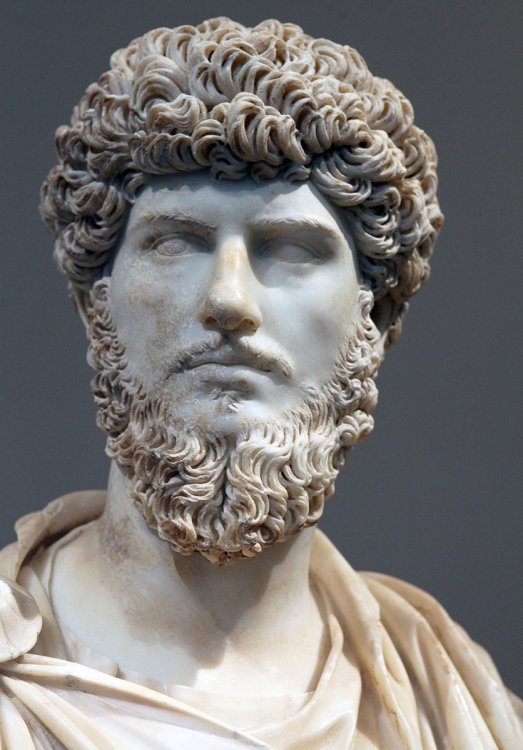Official:
Marcus Aurelius Antoninus. April 26, 121 – March 17, 180. Roman emperor of the Antonine dynasty, philosopher, representative of late Stoicism. Philosopher king.
Life and Work:
1. Anyone who comes to Rome even for a day, will pass by the Capitol, and, therefore, will see the equestrian statue of Marcus Aurelius. There is also the Column of Marcus Aurelius in Rome, which praises the victories of the emperor, who lived in the 2nd century AD.
2. They call Marcus Aurelius the philosopher king, and the word “philosopher” is not an allegory here.
3. He was born in Rome, a Senate member’s son. At birth, he was given the name Marcus Annius Verus.
4. Marcus Aurelius’ grandfather, also Marcus Aurelius Verus, was elected consul three times.
5. Marcus Aurelius wrote that to his grandfather he owed his gentle nature, to his mother he was grateful for piety and a simple way of life, to his great-grandfather – for a good education, to his father – for learning to be firm in his decisions. Then he thanked the gods for giving him such relatives.
6. The boy’s father died early, and he was first adopted by the third husband of the Emperor Hadrian’s mother, the consul Publius Catilius Severus. They began to call him Marcus Annius Catilius Severus.
7. Emperor Hadrian himself noticed the bright and intelligent boy with a noble and just nature. The laws of the Roman Empire allowed the transfer of power to a spiritual rather than a physical heir, and if Hadrian did not transfer power to Marcus Aurelius, it was only because the latter was too young.
8. Marcus Aurelius received a remarkable education at home. He mentions Diognetus, who introduced him to philosophy and taught him painting. According to Marcus Aurelius, the teacher freed him from superstition and forced to write dialogs.
9. In Latin, Verus means “truthful.” Hadrian, who liked Marcus very much, appreciated his sincerity and truthfulness, calling him Verissimus, that is, “the most truthful.” At the age of fifteen, Marcus received a man’s toga.
10. After his first foster father’s death, the boy was adopted by Hadrian’s successor, Antoninus Pius. The imperial heir was declared Caesar.
11. Marcus Aurelius was barely 17 when he assumed the office of quaestor and began performing administrative work.
12. In the same year, 138, he was betrothed to Annia Galeria Faustina, daughter of the Emperor Antoninus Pius, Hadrian’s successor on the throne. In this marriage, 12 children were born, but only four survived to see adulthood.
13. Marcus Aurelius led a reserved lifestyle – he wore a simple Greek cloak, avoided entertainment. On his teacher Diognetos’ advice, the future emperor slept on bare boards, covered with animal hide.
14. The most famous Stoic philosopher of his time, Quintus Junius Rusticus, became Marcus Aurelius’ key mentor in philosophy. It was he who put into the future emperor’s hands the works of Epictetus – nowadays, Marcus Aurelius is considered his follower.
15. There is evidence that other philosophers were also summoned to Rome in order to educate the future emperor. For example, the famous lawyer Lucius Volusius Maecianus taught Marcus Aurelius civil law.
16. At the age of forty, Marcus Aurelius assumed responsibility for the empire. For several years, he ruled together with Lucius Verus, who was also adopted by Antoninus Pius. After Lucius Verus’ early death, Marcus Aurelius became the sole ruler.
17. Not being inclined to military affairs, Marcus Aurelius was forced to wage wars. His reign was not calm: there was a flood of the Tiber, there were uprisings of the Germans and the Brits, a war with Parthia, a protracted war with the German tribe of the Marcomanni, unrest in northern Egypt.
18. Marcus Aurelius found death during a military campaign, though not from an arrow, but from the plague. It happened in the town of Vindobona on the Danube, now called Vienna.
19. Even in a warring empire, Marcus Aurelius was concerned with observing the laws and paid special attention to the judicial process.
20. In Athens, he established as many as four philosophy departments – one for each philosophy school – and granted the professors state allowance.
21. Marcus Aurelius’ work Meditations or Letters to Himself, written in Greek and discovered after his death in a military campaign – is a work that put the Roman emperor on a par with Montaigne, Seneca, and Solomon. Don’t be surprised if you encounter a different name – the Greek phrase that the author put in the title can be translated in different ways.
22. Before him, stoicism distinguished between the body and the soul, or pneuma. Marcus Aurelius added reason, or nus. If the former Stoics considered the soul to be the dominant component, Marcus Aurelius considered the reason to be the leading one. It is necessary to bring your mind into harmony with the nature of the whole and achieve dispassion through this. Happiness lies in harmony with the universal mind.
23. Here are just a few Marcus Aurelius’ thoughts: “As long as you live, as long as you can, become good.” “No man is happy who does not think himself so.” “The best revenge is to be unlike him who performed the injury.” “The object of life is not to be on the side of the majority, but to escape finding oneself in the ranks of the insane.” “A person is outraged by the evil that comes from the outside, from others – that which he cannot eliminate, yet he does not fight his own evil, although it is in his power.” “You have power over your mind - not outside events. Realize this, and you will find strength.”
24. Ilya Ilf jokingly asked, “Wasn’t Marcus Aurelius a Jew?” No, but he definitely was a cosmopolitan. “As Antoninus, my city and my fatherland is Rome; as a man, the Universe,” Marcus Aurelius confirms.
25. Now the portrait of this citizen of the Universe can be found all over Europe: the Italians erected a monument to Marcus Aurelius on their version of 50 eurocents. Marcus Aurelius is conquering Europe once again.






















